Breakfast Options for Dialysis
When it comes to low sodium breakfast options, dialysis patients have unique dietary needs. Many traditional breakfast foods are off-limits due to sodium, phosphorus, and potassium restrictions.
But with some creativity, there are plenty of delicious recipes that can help dialysis patients start the day on the right note! In this article, we'll explore tasty and nutritious breakfast options for dialysis patients.
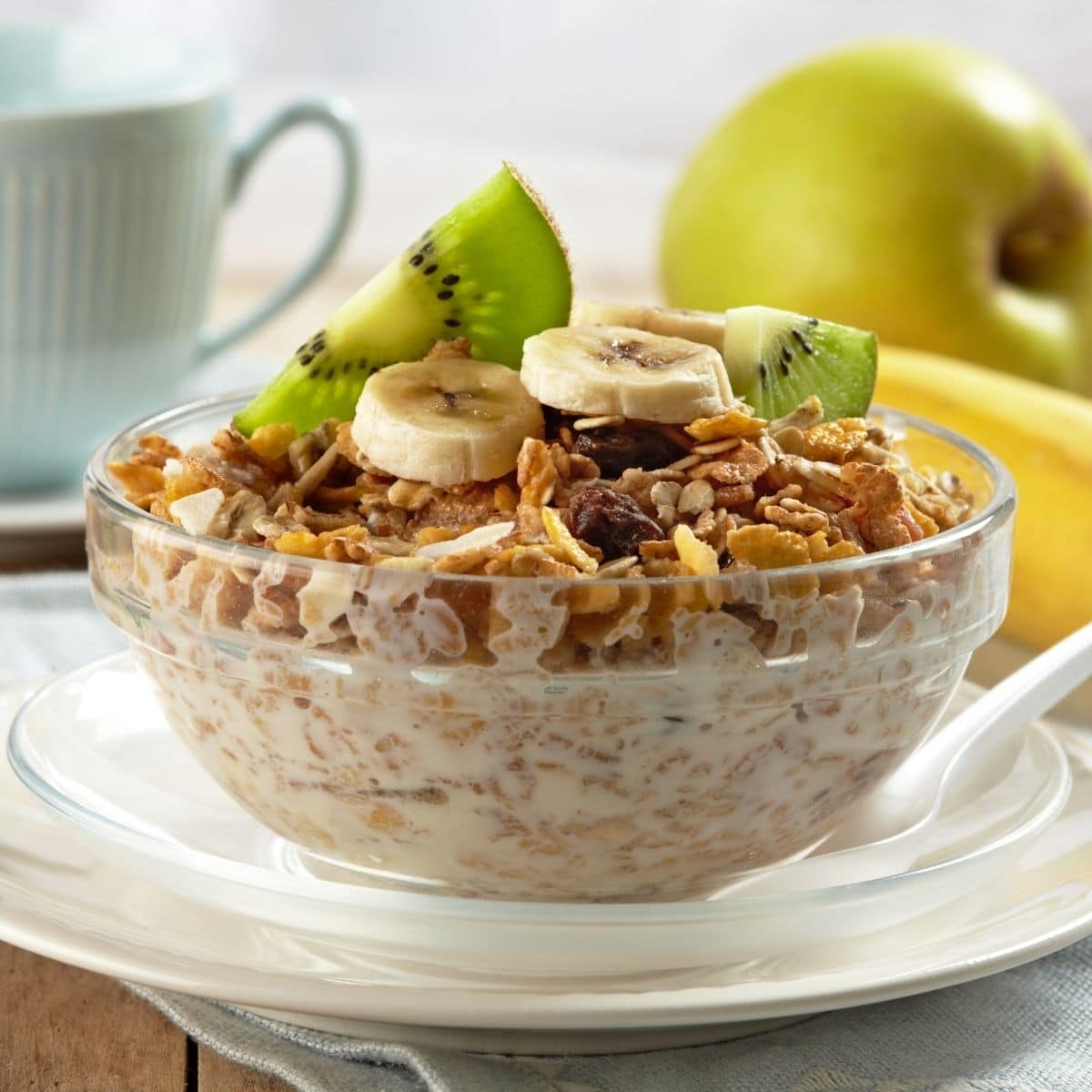
Breakfast is an important meal for everyone - but especially for those living with chronic kidney disease who must undergo regular dialysis treatments.
Eating a healthy breakfast gives them energy throughout the day and helps their bodies work more efficiently during treatment. But finding meals that meet their specific dietary requirements can be challenging.
Fortunately, there's no need to settle for bland or unsatisfying breakfasts when you're on dialysis! With a little bit of planning and knowledge about what ingredients you should avoid, you can create flavorful dishes that will nourish your body while still tasting great.
Jump to:
- Benefits Of Eating A Balanced Breakfast
- The Renal Diet for Breakfast
- Low Phosphorus Breakfast Ideas
- Low Potassium Breakfast Options
- Low Sodium Breakfast Alternatives
- High Protein Breakfasts For Dialysis Patients
- Healthy Fats To Include In Your Morning Meal
- Complex Carbohydrate Choices For Dialysis Breakfasts
- Fiber-Rich Foods To Start The Day Right
- Selecting Food Combinations For A Complete Breakfast
- Variety Is Key: Switching Up Your Morning Routine
- Breakfast Options for Dialysis Patients
- Tips And Tricks For Planning Ahead
- Frequently Asked Questions
- Breakfast Is A Healthy Choice With Eggs
Benefits Of Eating A Balanced Breakfast
The morning meal is often the most important of the day, and it's especially true for dialysis patients. Eating a balanced breakfast can provide them with essential nutrition to help maintain their health in many ways.
A well-balanced breakfast provides energy for daily activities, helps keep cholesterol levels under control, and promotes healthy body weight management.
Whether you need breakfast for dialysis patients or breakfast for ckd stage 3, there is something out there for everyone!
A nutrient-rich breakfast also contains vitamins, minerals, fiber, carbohydrates, proteins and fats that are necessary for overall health.
Whole grain cereals and breads give complex carbohydrates for energy; lean protein sources like eggs or yogurt provide satiety, amino acids, and sustained energy throughout the morning; and fruits, vegetables and low fat dairy products deliver essential vitamins and minerals needed for tissue repair and immunity.
In addition to these benefits, eating a balanced breakfast everyday has been shown to improve concentration skills in children as well as adults alike.
Breakfast gives us an opportunity to jumpstart our day—and our bodies—with proper nutrients so we can make smart food choices throughout the rest of the day. It’s wise for dialysis patients to take advantage of this chance by choosing nutritious foods that will fuel their minds and bodies with much-needed energy while helping promote good health over time.
For More Recipes and Ideas --->> Get Your Free Meals and Recipes That Are Perfect for Pre-Dialysis Diets, Pre-Dialysis with Diabetes, or Dialysis Diets.
The Renal Diet for Breakfast
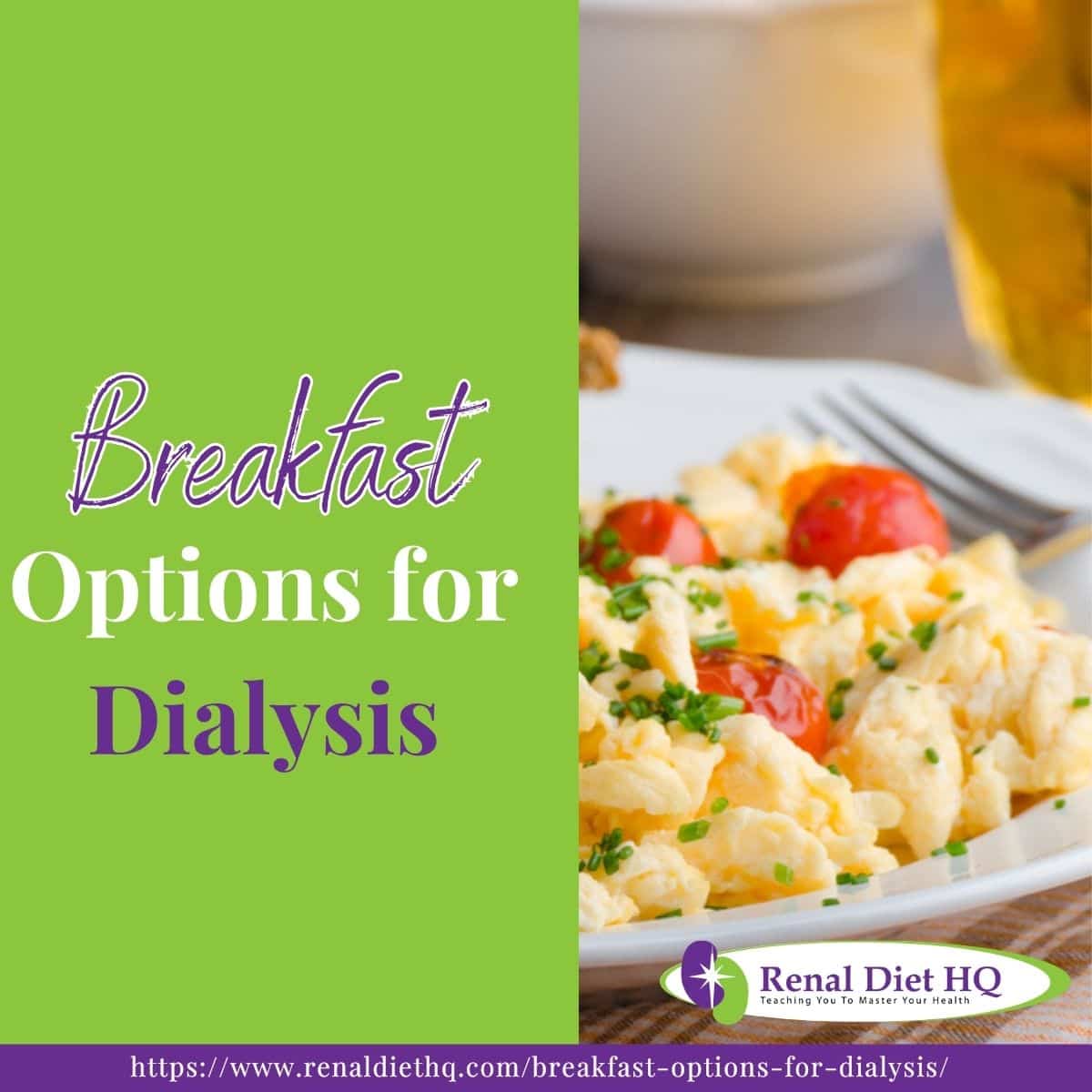
Dialysis patients often need to spend a good amount of time carefully considering each bite of food or sip of drink. This is because many foods have ingredients that can be harmful for patients that have chronic kidney disease.
Even during breakfast, it is important for dialysis patients to be adherent to the renal diet food list. Hence, careful consideration of the following specific nutrients will be of utmost importance.
Potassium
Potassium is another mineral that the kidneys usually regulate but are unable to with chronic kidney disease. A lot of foods contain potassium, and therefore need to be monitored or avoided.
Too high potassium levels can cause nausea, irregular heartbeat, and heart failure. Hence, most CKD patients need to be vigilant with potassium restriction in their diet.
There are low potassium cereals you can enjoy for breakfast, but there are also tips for a low potassium diet that you can follow!
Phosphorus
Another mineral that is found in foods and should be monitored is phosphorus. Too much phosphorus can leach the calcium out of your bones, making them weak and brittle. It can also cause a hardening of arteries and blood vessels, as well as other health problems.
Sodium
The biggest offender when it comes to food for dialysis patients is sodium. Sodium can be harmful in excess because it causes fluid retention, high blood pressure, and edema. Following a low sodium kidney diet gets easier as time goes on.
Dialysis patients have to particularly be careful with sodium because it is one function of the kidneys to flush out excess sodium in the blood.
When the kidneys are not functioning properly, they are not able to do a good enough job, and sodium can build up and cause serious issues.
Fluid Intake
Many chronic kidney disease patients, especially those with late stage kidney disease that have reached pre-dialysis or dialysis, need to be very careful of their fluid intake. There are many fluid restrictions for CKD patients.
This is because the kidneys typically filter out excess water in the body, but are unable to at this point.
Excess water in your body can cause extreme swelling, pitting edema, high blood pressure, and a host of other life threatening issues.
This means that every sip of water or other beverage you take needs to be accounted for. Knowing the kidney friendly drinks you can drink is so vital to following this diet.
Having an understanding of how different nutritional requirements come into play for those receiving dialysis treatments is key for achieving overall good health outcomes.
With careful adherence to the suggested dietary guidelines established by healthcare professionals as well as proper monitoring of electrolyte balance within the body – dialysis patients can live healthier lives despite this challenging condition.
Low Phosphorus Breakfast Ideas
It is essential to consider kidney-friendly breakfast ideas for dialysis patients. Low phosphorus breakfasts are a key component of maintaining optimal health while undergoing dialysis treatments.
Through careful meal planning and mindful portion control, dialysis friendly breakfasts can be easily achieved. You can also follow this 7 day meal plan for kidney disease.
When thinking about what constitutes a low phosphorus breakfast option, there are several choices that should be considered.
Whole grain toast with peanut butter or jelly; oatmeal topped with nuts and fruit; egg dishes such as scrambles, omelets, and frittatas made with vegetables;
Greek yogurt for ckd patients includes parfaits layered with fresh berries and granola; smoothies made with almond milk or coconut water; pancakes using whole wheat flour in place of white all-purpose flour – these are just some examples of phosphorus free breakfasts enjoyed by many dialysis patients.
As long as portions remain reasonable and ingredients are carefully chosen, this list could go on!
As you can see, there are plenty of delicious and nutritious renal diet breakfast ideas available that don't contain large amounts of phosphorus. By making sure your meals stay within the recommended daily allowance (RDA) for phosphorus intake set by your doctor or dietitian, you can enjoy eating a balanced breakfast without compromising your health.
Low Potassium Breakfast Options
When it comes to dialysis patients, choosing the right breakfast options can be tricky. Low-potassium meals are a must for those with kidney issues and so finding breakfast foods that meet this criteria is essential.
Thankfully, there are plenty of delicious low potassium choices available that make a great start to any day.
From oatmeal topped with fresh fruit and nuts to smoothies made from almond milk and berries, there are ample possibilities when it comes to dialysis friendly low potassium breakfasts.
For even more variety, recipes like vegetable frittata or avocado toast provide tasty alternatives without going over your daily recommended limit of potassium intake.
No matter what you choose, all these items can help keep you feeling energized throughout the morning hours while also giving your body much needed nutrition.
Finding flavorful dishes doesn’t have to mean sacrificing on quality either - try out some new ideas such as buckwheat pancakes served with Greek yogurt or baked sweet potato hash browns!
With a bit of creativity and determination, you'll soon find yourself enjoying an array of low-potassium breakfast recipes every single day.
Low Sodium Breakfast Alternatives
For dialysis patients looking for low sodium breakfast options that are both nutritious and delicious, the possibilities seem endless.
With proper planning and preparation, you can create a variety of tasty dishes to keep your meals interesting while helping you meet your dietary needs.
To help get started on your journey towards finding enjoyable yet healthy low-sodium breakfast alternatives, here are some ideas:
- Try swapping out normal table salt with alternative seasonings such as turmeric or garlic powder, which adds flavor without adding too much sodium.
- Make use of fresh herbs like basil or oregano in place of salt when seasoning food.
- Swap out high-sodium condiments like soy sauce for unsalted versions. There are condiments for kidney disease.
When it comes to renal diet breakfast recipes there’s no shortage either! From smoothies bursting with flavor yet light on the sodium count to savory breakfast omelets loaded with vegetables.
Creating scrumptious breakfasts is simply a matter of experimenting with different ingredients. Look up low sodium breakfast recipes online or try making substitutions from what's already in your pantry - if something tastes good then chances are it will be good for your health too!
There’s nothing more satisfying than starting off each day knowing that you’re doing right by yourself.
High Protein Breakfasts For Dialysis Patients
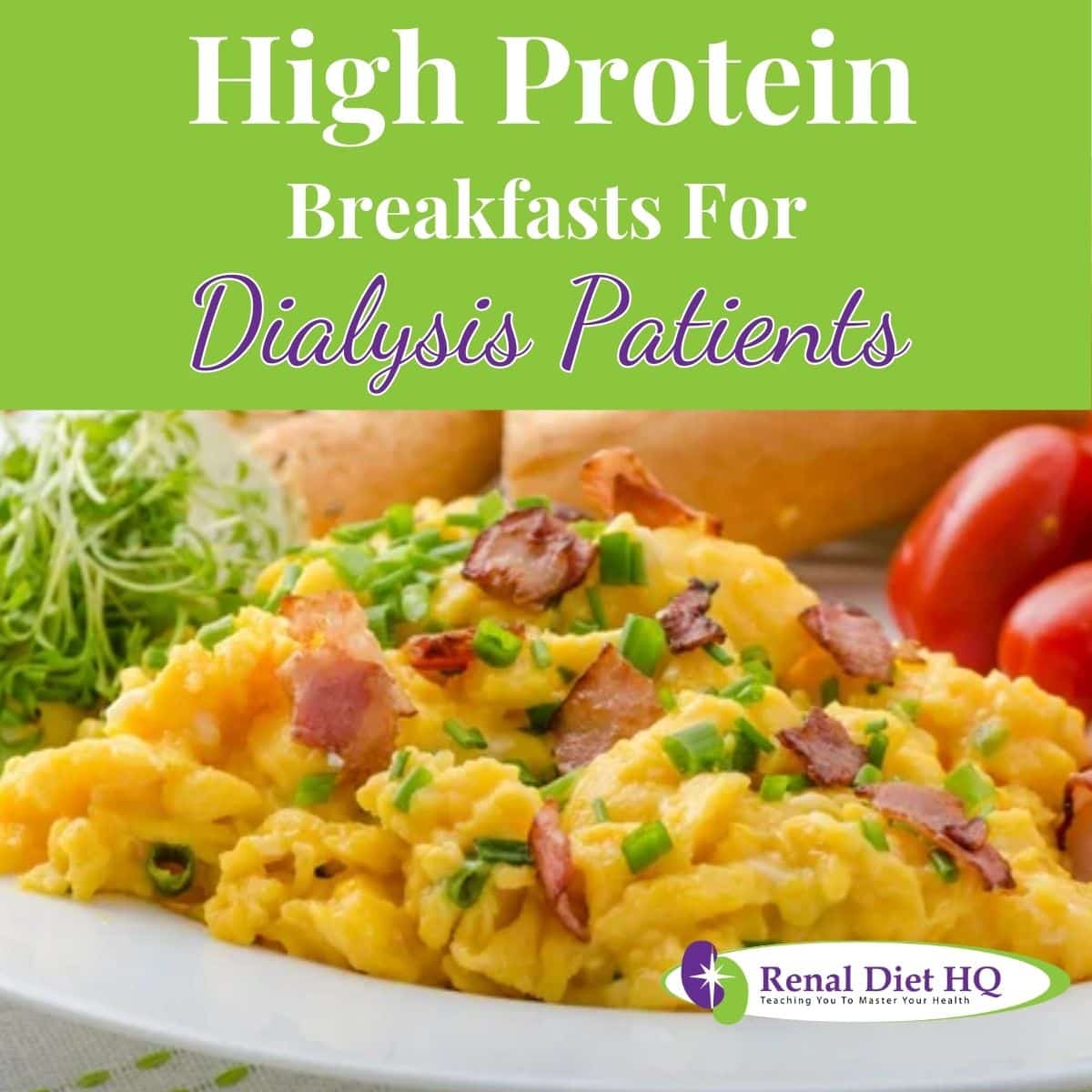
For dialysis patients, a high-protein diet is essential. Protein helps to rebuild muscle tissue, which can be lost in the filtration process during dialysis treatments.
Eating protein-rich foods at breakfast can help keep muscles healthy and prevent weight loss associated with chronic kidney disease or renal failure. There is a renal failure diet you can also check out!
When selecting breakfast items for a dialysis patient, look for meals that are low in potassium, phosphorus, sodium and fluids.
Examples of acceptable options include...
- Eggs cooked without butter or oil; lean meats such as chicken breast strips
- Dairy products made from skim milk; cottage cheese; Greek yogurt;
- Oatmeal topped with nuts and dried fruit
- Wwhole grain toast spread with nut butters and fruits like raspberries or blueberries
- Smoothies for kidney disease blended with almond milk and protein powder;
- Quinoa breakfast porridge made with coconut milk. Is quinoa good for kidney disease? The answer is, yes!
- Chia pudding prepared with almond milk.
Dialysis-friendly breakfasts provide much needed nutrition while helping manage these strict dietary restrictions so important in maintaining optimal health.
With careful planning ahead, it’s easy to create delicious and nutritious morning meals that will get any day off to a great start!
Healthy Fats To Include In Your Morning Meal
It’s no secret that dialysis patients need to be extra mindful of their diets. However, it can still be easy to forget the importance of healthy fats in your daily nutrition routine as these are needed for absorption and storage of certain vitamins.
In patients with CKD, fat should be limited to <30 percent of daily energy intake, with saturated fat limited to <10 percent energy. These are heart healthy lifestyle changes for CKD patients.
So what are some great breakfast options that include these beneficial fats? Avocado toast is an excellent choice! Top whole grain bread with mashed avocado, tomato slices, and cracked black pepper for a quick, delicious meal packed with good-for-you monounsaturated fat.
You could also spread almond butter on toast or waffles for a protein and fiber boost as well as essential vitamins like Vitamin E and magnesium.
If you have time to make something more substantial, try cooking up scrambled eggs with some olive oil or adding omega 3 rich salmon to your morning omelet.
No matter which option you choose, incorporating healthy fats into your daily diet will not only provide necessary nutrients but may also improve overall health outcomes related to dialysis treatment.
Complex Carbohydrate Choices For Dialysis Breakfasts
Breakfast is the most important meal of the day, and dialysis patients are no exception. It's essential to start the day off with a good balance of carbs, proteins, fats and fluids.
Complex carbohydrates should make up the majority of your breakfast foods if you're on dialysis.
You'll find things like oatmeal and kidney disease go really well together because they are whole-grain cereals.
Whole-grain cereals like oatmeal barley and quinoa are excellent complex carbohydrate choices for any breakfast menu. They provide plenty of vitamins, minerals and fiber that help keep blood sugar levels steady throughout the morning hours.
Renal diet snacks such as nuts or seeds can also be incorporated into your diet in order to meet your daily carb needs while still providing essential nutrients.
Multi-grain breads can add an extra layer of flavor and texture to any breakfast dish; they come in many varieties so it's easy to find one that meets your dietary restrictions.
Additionally, there are countless options available for those who prefer sweet breakfasts: yogurt parfaits made with granola or fresh fruit slices over whole grain toast spread with nut butter are some great ideas! Guess what the best peanut butter for renal diet?
All these items will ensure you get enough carbs without going overboard on calories or processed ingredients.
No matter what type of breakfast you choose, remember to monitor your portion sizes carefully and stay hydrated throughout the day, following your individual fluid restriction– this will help keep all bodily functions running optimally during dialysis treatments.
With these tips, anyone on dialysis can easily create healthy meals that not only taste great but also supply them with much-needed energy!
Fiber-Rich Foods To Start The Day Right
Dialysis patients can reap the benefits of fiber-rich foods to start their day right. Fiber helps with digestion and regularity, promotes a feeling of fullness, and may also reduce cholesterol levels. Additionally, these nutrient-packed options offer essential vitamins and minerals for improved overall well-being. Here are some delicious breakfast ideas dialysis patients should consider adding to their morning menu:
| Food | Fiber (g) per Serving |
| Oatmeal | 4 g |
| Whole wheat toast | 3 g |
| Berries | 8 g/cup |
| Black beans | 7 g/half cup |
| Almonds | 3 g/ounce |
Starting your day with oatmeal gives you an early boost of energy while providing 4 grams of fiber in each serving. Whole wheat toast is a great accompaniment, offering 3 more grams of dietary fiber.
Berries make for a tasty topping that will add 8 grams of fiber when eaten in one cup servings. Give this black bean and rice burrito recipe a try!
Black beans provide an excellent source of plant protein plus 7 grams of dietary fiber per half cup portion. Almonds are another satisfying snack high in healthy fats as well as 3 grams of dietary fiber per ounce.
Eating any combination of these top 5 sources at breakfast time ensures dialysis patients get off to the best possible start nutritionally every single day!
Furthermore, making sure there's always something on hand to grab when hunger strikes during midmorning or afternoon snacks keeps cravings under control between meals and provides additional opportunities for meeting daily nutritional needs without exceeding recommended potassium or phosphorus intake limits.
Selecting Food Combinations For A Complete Breakfast
Breakfast is an important meal for dialysis patients. It provides essential energy and nutrition needed to start the day with a balanced meal combination. When planning breakfast meals, it’s important to provide complete nutrition that includes protein, carbohydrates, and fats.
Along with selecting nutritious foods, it's also beneficial to include fresh fruits or vegetables as part of the breakfast meal. Fruits like apples or oranges are high in potassium which should be monitored carefully when on dialysis.
Vegetables such as broccoli and spinach contain necessary vitamins and minerals which can help boost your immune system during treatment. Careful portioning is important as many fruits and vegetables have high potassium content.
For those who need additional calories, nuts and seeds make great additions to any breakfast meal. They pack a powerful punch of healthy fats along with fiber and other nutrients that are all beneficial for dialysis patients’ diets. Yes, there are even specific recipes for dialysis patients that you can check out!
With some careful thought and creativity, you can create a delicious yet nutritionally-balanced breakfast menu tailored just for you!
Variety Is Key: Switching Up Your Morning Routine
It's understandable to feel that dialysis patients may be limited in their breakfast options. But, it doesn't have to always be a bowl of cereal and some toast! There are plenty of novel breakfast options out there for those on dialysis, like smoothie bowls or overnight oats. You can even eat eggs on a renal diet.
These recipes can be tailored to suit individual dietary needs while also providing an exciting change from the same old routine.
By diversifying morning meals, you're able to inject new flavors and textures into your diet. For example, try swapping traditional oatmeal for savory porridge made with quinoa, fresh herbs, and vegetables.
Or add a twist to your typical egg scramble by adding beans and avocado slices instead of cheese. With just a few small changes, you can spice up your breakfasts without compromising nutrition levels.
You don't need to limit yourself to boring dishes - get creative in the kitchen! Experimenting with different ingredients will not only give you something delicious but also provide important nutrients needed during dialysis treatments.
So why not take advantage of these opportunities and start exploring new breakfast recipes today?
Breakfast Options for Dialysis Patients
To help you get started, here are some simple breakfast options that you can follow:
Breakfast Burritos Eggs
Chopped bell peppers, chilies, and a small amount of hot sauce are scrambled together then wrapped in a tortilla and topped with a tablespoon of salsa.
Homemade Pancakes
Making your own pancake mix rather than using store bought mixes helps avoid unnecessary sodium.
For enough for two people, use: 1 cup all-purpose white flour, ½ teaspoon baking soda, ½ tablespoon sugar, 1 egg, 1 cup low fat milk, ½ tablespoon white or apple cider vinegar, and 1 tablespoon of vegetable oil together.
Stir together the milk and vinegar and let sit for a few minutes while you mix all of the dry ingredients together.
Beat eggs until fluffy, then add the milk mixture. Add the rest of the ingredients and mix until combined. Pour the batter in ¼ increments onto a hot griddle, and flip when the batter begins to bubble.
Vegetable Omelet
Make an omelet with fresh low-potassium vegetables such as bell peppers, green onion, squash, carrots, celery, and other veggies. You can enjoy fresh or canned vegetables for a renal diet.
Quick Options: A plain bagel, toasted, with 2 tablespoons of cream cheese. Two slices of white bread, toasted, with low sodium jam and a side of cottage cheese.
These and more are healthy breakfast options for dialysis patients. Just because you are on a restricted diet does not mean that you can no longer enjoy meals. Of course, always talk to your doctor about your food choices as not all situations are the same.
Tips And Tricks For Planning Ahead
Planning ahead is the key to success when it comes to prepping meals, especially breakfasts, for dialysis patients. Here are some tips and tricks that can make meal planning easier:
1. Invest in a slow cooker or pressure cooker – these tools are great for preparing large batches of food quickly, allowing you to easily freeze leftovers for later use.
2. Look into meal delivery services – they will provide healthy options without having to worry about grocery shopping. However, it is important to let your provider know your specific dietary needs.
3. Try out new recipes – experiment with breakfast recipes that are both nutritious and delicious!
4. Make advanced plans – plan your weekly menu in advance so that you know exactly what ingredients need to be purchased and how much time needs to be allocated for preparation each day.
By following these simple steps, individuals on dialysis can ensure that their breakfasts are balanced and nourishing while also saving time and energy throughout the week.
Meal prep doesn’t have to be tedious or difficult; by taking a few extra moments at the start of every week, dialysis patients can enjoy nutrient-rich breakfasts every day with minimal effort required from them! Listen to this podcast on the best kidney diet meal prepping tips.
Frequently Asked Questions
Eating a balanced breakfast is essential for maintaining good overall health. An unbalanced diet can lead to numerous dietary risks, making it important to understand the nutrition benefits of eating breakfast each day.
Breakfast is the most important meal of the day and provides several key nutrients: 1. Protein helps build muscle and repair tissues 2. Carbohydrates give you energy throughout your morning activities
3. Fats provide essential fatty acids that are beneficial for heart health 4. Vitamins and minerals help with cell growth and metabolism
Not getting enough of these vital nutrients can have serious consequences on our bodies in the short-term and long-term.
Eating an unhealthy or incomplete breakfast can cause fatigue, difficulty concentrating, low blood sugar levels, poor digestion, weight gain, and even malnutrition over time, especially for patients undergoing dialysis.
Skipping breakfast altogether increases one’s risk of developing chronic illnesses such as diabetes, heart disease, obesity, and high cholesterol—all potentially life-threatening conditions if left untreated.
If you don't know what to make for breakfast, then give this 7-day meal plan for kidney disease and diabetes a try!
Maintaining a healthy lifestyle even while on dialysis means taking conscious steps to ensure proper nutrition at every meal—including breakfast!
When we start our days off right with a balanced breakfast full of protein, carbohydrates, fats, vitamins, and minerals; we set ourselves up for a great day ahead!
Starting the day right can be a challenge for dialysis patients, especially with limited options when it comes to breakfast.
However, snacks throughout the day are an important way to maintain energy levels and provide vital nutrients. Here are some great snacks for ckd and diabetes to enjoy on their diet.
Fruits and vegetables like apples, carrots, celery sticks, oranges or grapes make excellent on-the-go snacks that contain fiber as well as vitamins and minerals.
Additionally, protein sources such as hard boiled eggs, hummus dip with pita chips, yogurt parfaits and nuts offer satisfying flavors and critical fuel for energy production.
Snacks don’t have to be complicated either – simple yet nourishing meals can easily be prepared at home in advance so they’re ready whenever needed. Try making your own trail mix by combining whole grain cereal with dried fruit pieces.
Granola bars topped with peanut butter and banana slices or homemade smoothies full of fresh ingredients like berries, spinach and nut milk are also great options.
Dialysis patients can also find pre-made treats like low sodium crackers or popcorn which offer convenience without compromising health benefits.
No matter what type of snack you choose – whether prepped ahead of time or picked up quickly on the go – healthy eating should always remain top priority for those living with kidney disease. Snack smartly and watch your wellbeing thrive!
When it comes to breakfast, there are some important things to consider if you're on dialysis. Avoiding dairy products, processed foods and high-salt foods can be essential for good health.
It's also a good idea to take into account the amount of potassium, phosphorus and sodium that is in your food choices. Dairy products like milk and cheese contain high levels of potassium which can cause problems with electrolytes in people who undergo dialysis.
Processed foods tend to have high sodium content as well as other unhealthy ingredients. It’s best to avoid these types of food altogether when creating meals for yourself or someone else undergoing dialysis treatments.
The best way to ensure healthy eating during breakfast time is by focusing on whole grains, fruits and vegetables instead of refined carbohydrates such as white bread or sugary cereals.
Opting for lean proteins like eggs, fish or tofu as part of the meal is also an excellent choice. Eating this type of balanced diet will help keep blood pressure low while providing all the necessary nutrients needed throughout the day.
To make sure that you are fulfilling all your diet restrictions on dialysis, it is important to always be guided by your doctor and dietician so that your personal nutritional needs even for breakfast are always met.
When it comes to making sure we are getting enough nutrients in our breakfast, dialysis patients can face unique challenges.
Because of the specific diet restrictions for this population, finding a balanced and nutrient-rich breakfast that is also enjoyable can be difficult. It’s important for dialysis patients to stay mindful of their dietary needs when choosing what they eat in the morning.
In order to get the most out of your breakfast each morning, it's essential to make sure it is both balanced and nutrient-rich, so you don't end up feeling hungry an hour later or missing out on vital vitamins and minerals throughout the day.
Most importantly, regular evaluation by your physician and consultation with your nutritionist can help keep your diet in check. Advice from your trusted professionals can help make sure that you are eating the right and following mindful eating tips for a renal diet based on your needs.
Breakfast Is A Healthy Choice With Eggs
It's essential for dialysis patients to eat a balanced breakfast every day and be aware of the potential health risks if they don't. Eating snacks can help those on dialysis get enough nutrients, but it’s important to make sure that these are the right foods within your dietary restrictions. .
Being mindful of your individualized dietary needs can also help you stay healthy and avoid any negative side effects from excessive or deficient intake.
Breakfast is an opportunity to start your day right and nourish your body with all the nutrients you . It doesn't have to be complicated or time-consuming; simple options like oatmeal or cereal are easy ways to get some good nutrition first thing in the morning. You can also take a look at this list to see what dialysis diet foods to avoid!
For dialysis patients, this means being aware of certain foods that work best for their needs and which ones should be avoided. Having a good, nutritious breakfast is also part of self-care, which sets you up for the best quality of life you can get, even while being on dialysis.
Making sure that breakfast is part of your daily routine as a dialysis patient will ensure that you're getting all the vitamins, minerals and other nutrients needed to stay healthy and strong.
With the right recipes using the right ingredients, you could get not only the best nutrition, but also a wonderful culinary experience for breakfast!


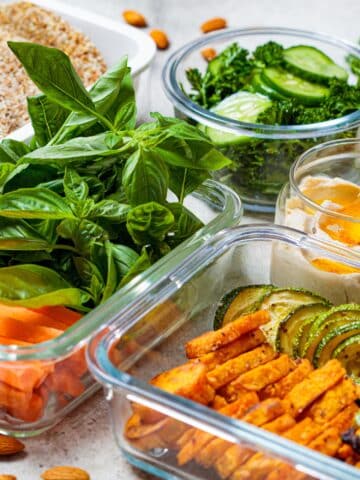
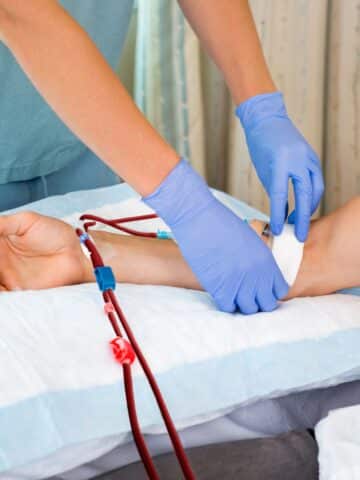
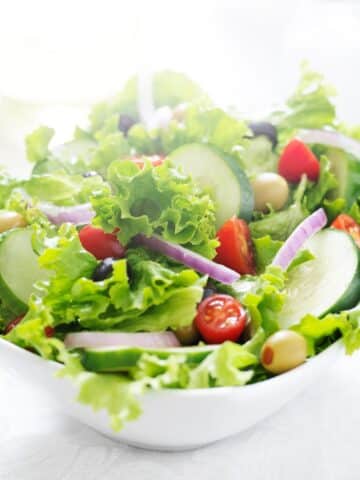
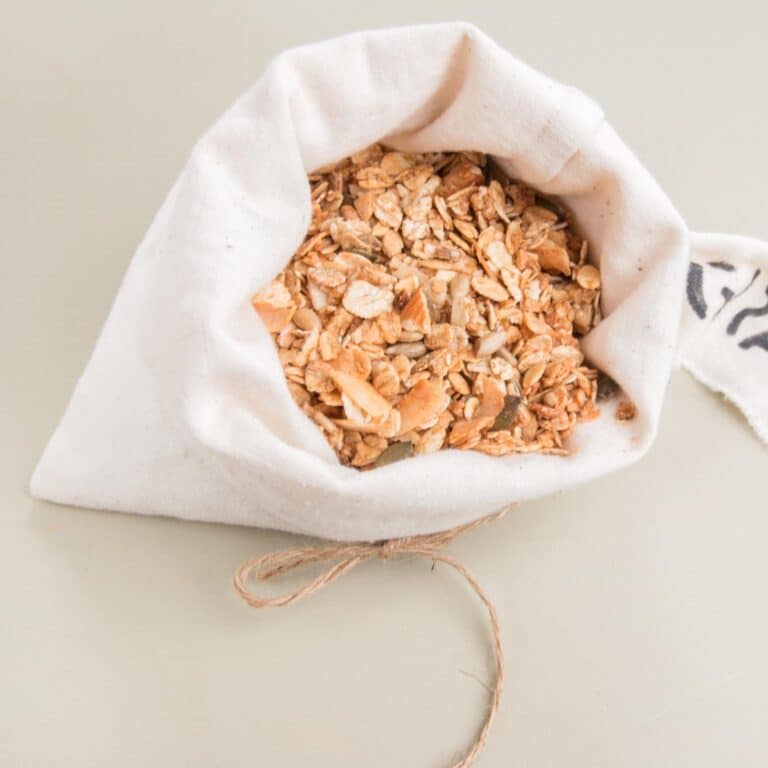
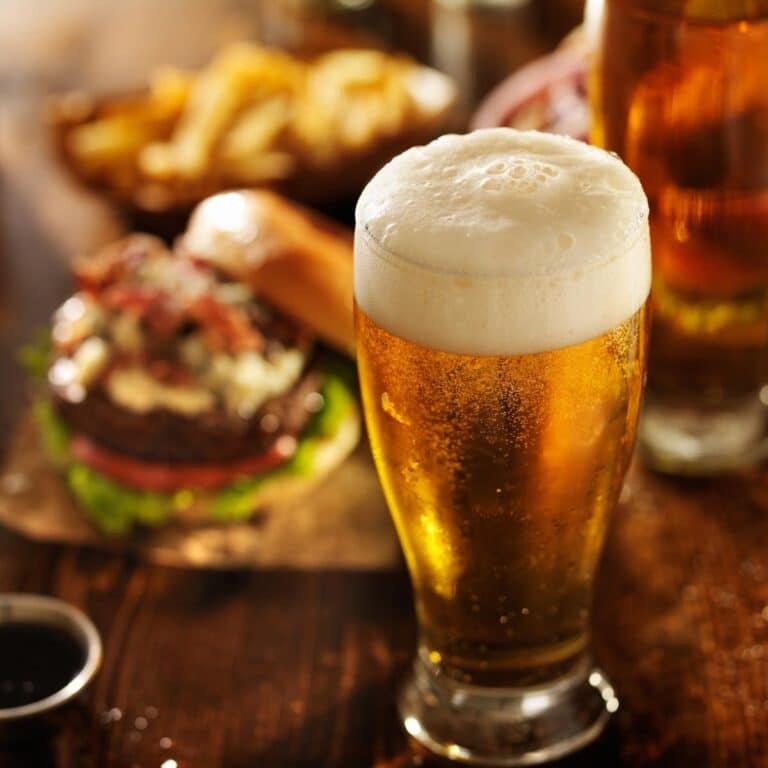
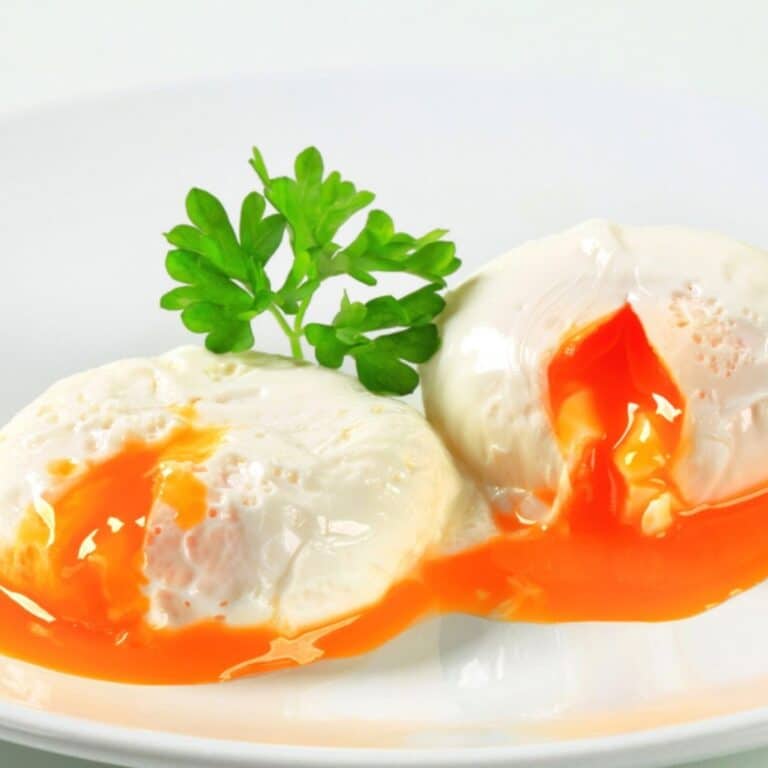

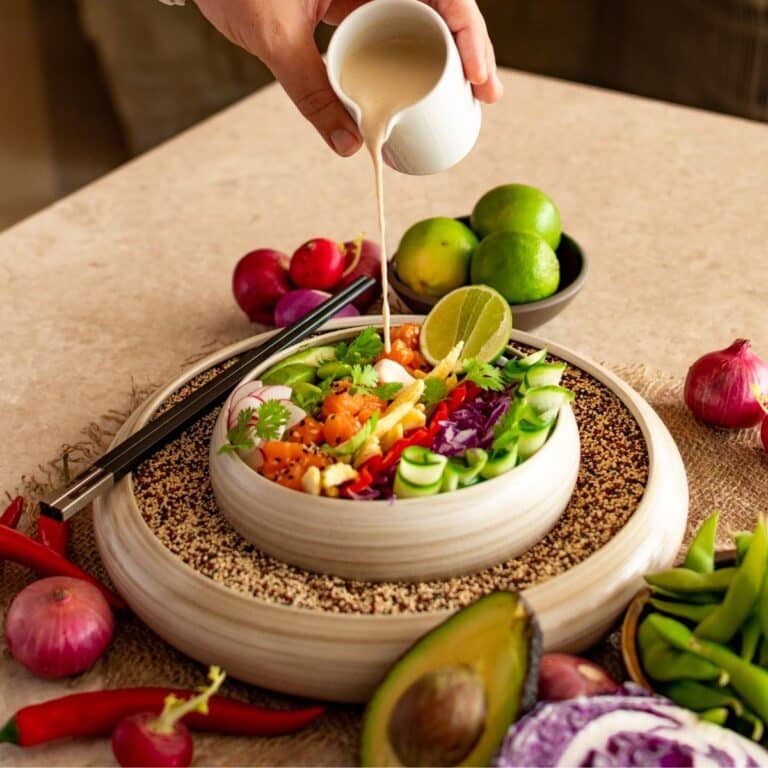


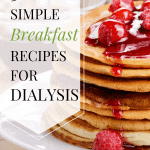

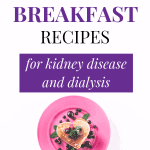

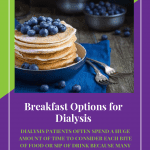
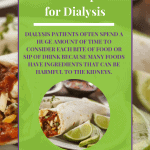



I would like to know a diet for Stage 5 Renal Failure, all these diets are for any dialysis patient. Well Stage 5 is much stricter with diet. Can you help?
Howdy! I could have sworn I've been to this website before but after checking through some
of the post I realized it's new to me. Nonetheless, I'm definitely happy I found it and I'll be book-marking and checking back often!